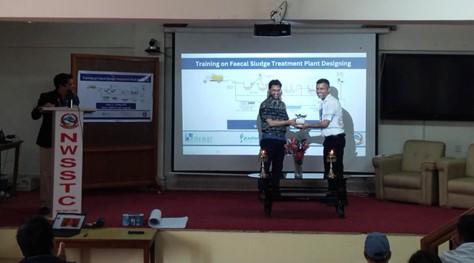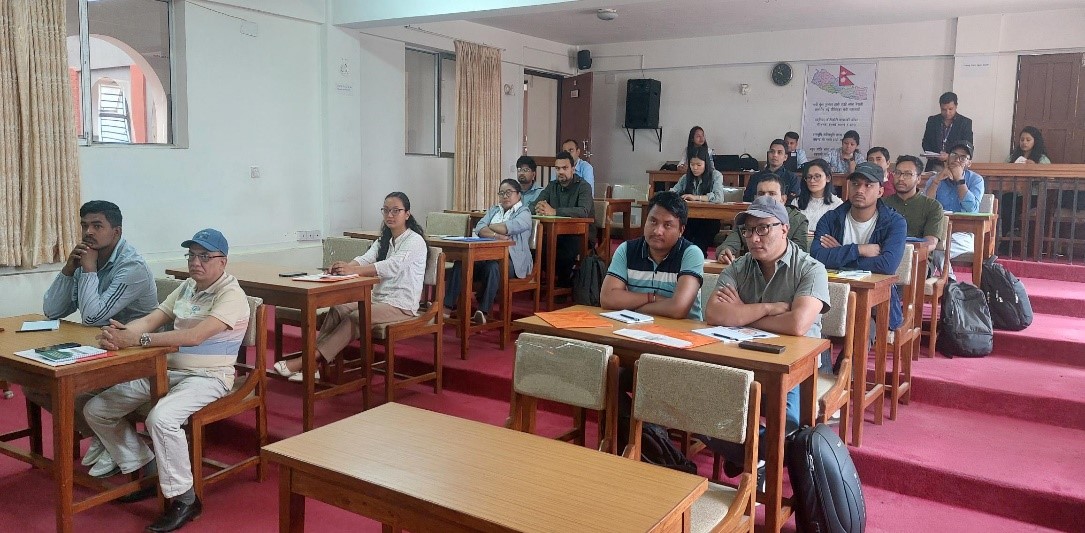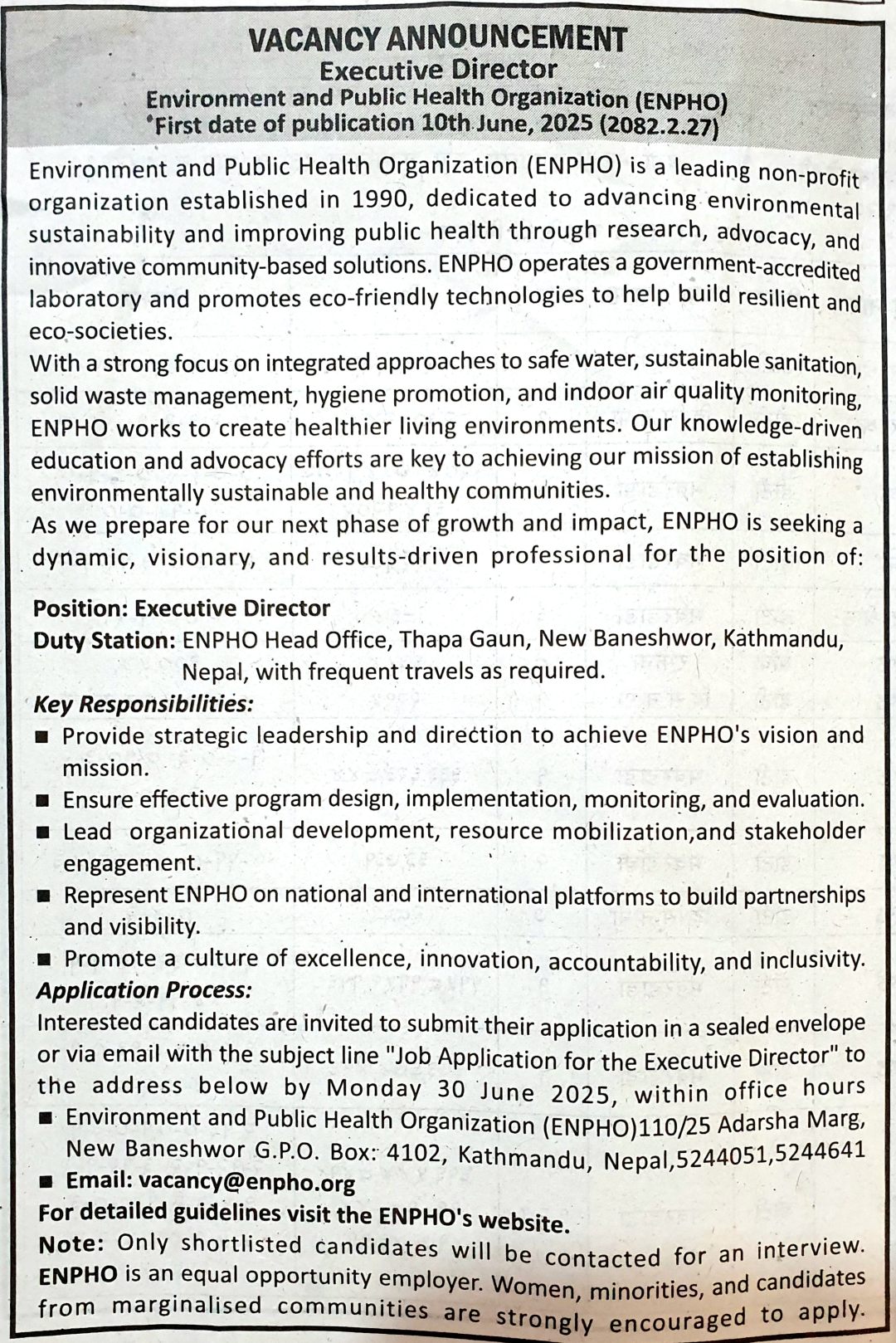Nepal made significant strides in achieving Open Defecation Free (ODF) status in 2019 by ensuring access to toilets in every household. However, the focus has now shifted to addressing the challenges of managing fecal sludge effectively, particularly in urban areas. Despite the presence of 17 Faecal Sludge Treatment Plants (FSTPs) across the country, in different municipalities, there is a lack of consistent monitoring and assessment of their operational status. Only 8 FSTPs are currently operating effectively. It’s estimated that Nepal generates around 2,925 cubic meters of fecal sludge every day and yet proper management of fecal sludge practices are not being implemented. Issues such as inadequate maintenance, operational deficiencies, lack of skilled human resources and guidelines, as well as financial and resource constraints, contribute to the suboptimal performance or shutdowns of these facilities.
To achieve Nepal’s Sustainable Development Goal (SDG) 6.2 targets, it’s essential to develop a comprehensive understanding of Faecal Sludge Management (FSM) practices and ensure proper FSTP designs. This requires building expertise and enhancing capabilities in FSM to improve overall efficiency and effectiveness in managing fecal sludge. In this regard, the National Water Supply and Sanitation Training Center (NWSSTC) with the support of Environment and Public Health Organization (ENPHO), jointly organized ‘Faecal Sludge Treatment Plant Design Training’ from 6 to 8 May 2024 at NWSSTC Nagarkot. The major objective of the training was to capacitate and enhance public and private sector engineers with the knowledge and expertise needed to design FSTP.
The training kicked off with an inaugural session on 6 May 2024 which was chaired by Dr. Rajit Ojha (Chief, NWSSTC) and Mr. Rajendra Shrestha (Program Director, ENPHO).

Opening Remarks
“On behalf of NWSSTC, I extend a warm welcome to all participants of this training and express gratitude to the ENPHO team for their organization. This training, facilitated through an MoU between ENPHO and NWSSTC, aims to bolster capacity-building efforts on a global scale. FSTPs are recognized as viable solutions for fostering clean cities, accessible to local governments and easy to operate, thereby contributing to safely managed sanitation. Additionally, we plan to offer a one-day training package on FSTP and will select participants from this training to serve as resource persons.”- Dr. Rajit Ojha, Chief, NWSSTC
“Welcome, everyone, to the three-day FSTP design training. With the increasing importance of addressing faecal sludge effectively and bridging the capacity gap, the design and construction of FSTPs play a crucial role. This training session has been organized in response to the demand from numerous engineers and so we believe to develop experts and trainers through this training for the further.”- Ash Kumar Khaitu Program Manager, ENPHO
Mr. Rajendra Shrestha and Mr. Jagam Shrestha from ENPHO were the resource persons for the training. Altogether, 18 engineers from different organizations including the Department of Water Supply and Sewerage Management (DWSSM), municipalities, and development partners attended the training.

A three-day design training covered a wide range of information on FSM, characterization of FSM, sanitation practices in global and local context, design objective and parameter along with all the practice session. Each participant was provided with an individual case for design practice, which effectively enriched their knowledge. A full day was dedicated to practical exercises, including hands-on sessions on various components such as septic tank, ABR, AF, Sludge drying bed, constructed wetland, hands on practice of designing FSTP, FSTP site layout and planning, costing of FSTP, construction and commissioning of FSTP.
Following the extensive three-day design training, participants expressed enthusiasm about applying their newfound knowledge and skills in real-world scenarios. Many highlighted their intentions to integrate the knowledge gained into their professional practices. They emphasized the importance of collaboration with local authorities and stakeholders to ensure successful implementation. Furthermore, participants discussed strategies for overcoming potential challenges in implementing fecal sludge management (FSM) practices in their areas. Additionally, participants highlighted the significance of continuous learning and knowledge sharing within their professional networks. They expressed their commitment to staying updated on advancements in FSM technology and best practices through further training programs, workshops, and conferences.
Thus, the three-day training on FSTP design was provided successfully to the initially targeted public and private sector engineers responsible for the planning, designing, implementing and operating fecal sludge treatment systems, infrastructure, and services.
The training concluded with a formal closing ceremony. During this session, Mr. Rajit Ojha, Chief NWSSTC and Ms. Bhawana Sharma, Executive Director ENPHO, were honored as chief guests. They shared their remarks on the training, and additionally, four participants voluntarily put forth their remarks. At the end of the closing ceremony, certificates, which are ISO 9001:2015 certified, were distributed to each participant.
Voice from Participants
“After participating in this intensive three-day training, I’ve gained a deep understanding of FSTP design. As I have completed my masters in sanitation, these practical sessions have enhanced my knowledge. I express my sincere appreciation to the entire teams of ENPHO and NWSSTC for their invaluable facilitation of this training.” – Ms. Sharmila Maharajan
“I want to extend my heartfelt gratitude to the entire teams of ENPHO and NWSSTC for organizing this training. Personally, this training has been incredibly beneficial for me, as I’ve gained extensive knowledge on FSTP designing, that I plan to implement in my municipality.”- Mr. Yubraj Poudel






